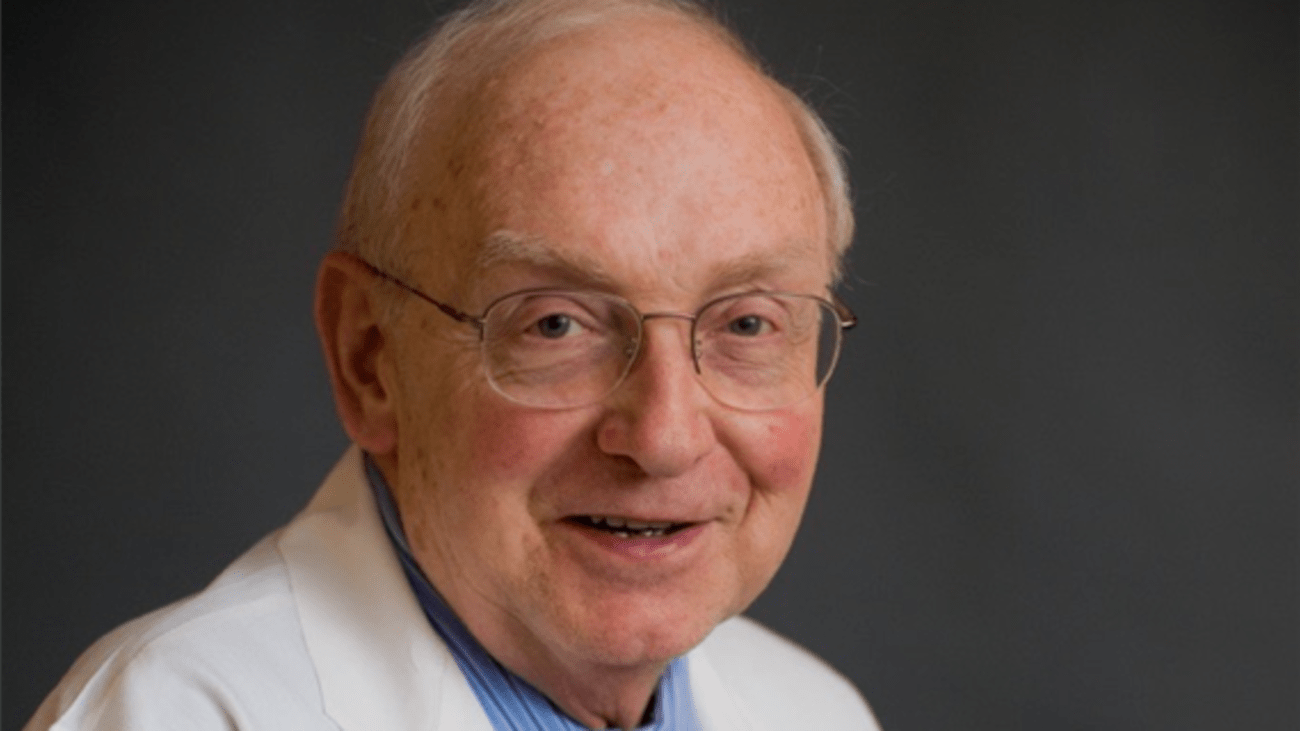

The Dana-Farber community mourns the passing of Arthur T. Skarin, MD, of Needham, Massachusetts. Skarin died Sunday, Sept. 4, at the age of 87 following a long illness. He retired from the Institute in 2010, where he committed 40 years of service in hematology and thoracic oncology as a physician-scientist, teacher, and mentor. He was known by all for his compassion and kindness.
David G. Nathan, MD, president emeritus of Dana-Farber, wrote in a letter of condolence to Skarin’s wife, Roslyn, “I just learned that we have lost Arthur. I’m truly sorry for you, your family, and for academic oncology. Art was a brilliant physician totally devoted to his patients to whom he was both committed and understanding. He was, in addition, a great teacher and an example setter for all of us. Art was a man one liked as soon as one met him. He was kind, open, and always willing to listen. I admired him and I will surely miss him.”
In the letter, Nathan also wrote that Skarin’s “wizardry with a camera was legendary,” referring to the lifelong passion for photography that Skarin pursued both in making images of cancer-related subjects and in capturing natural landscapes, especially the ocean, waterfront, and boating subjects.
Skarin, who was an associate professor of medicine at Harvard Medical School, graduated from the Jacobs School of Medicine and Biomedical Sciences at the University of Buffalo in 1961. He served in the U.S. Air Force from 1966 to 1968 in Amarillo, Texas before moving to Massachusetts, where he joined the hematology department at what was then the Peter Bent Brigham Hospital. In 1970 he was recruited to join what would become the Dana-Farber Cancer Institute.
“Art was the Renaissance man of Dana-Farber,” says George Canellos, MD, a senior physician at the Institute. He also called Skarin an “unsung hero” who worked with Canellos and others to build the adult oncology program at Dana-Farber. Canellos says the passing of Skarin was “A tragic loss of a loyal Dana-Farber doctor. He was a great help in getting the Farber known in the early days. I will never forget him.”
In a clinical advance, Skarin, Canellos, and Emil “Tom” Frei, III MD, developed a therapy for adults with non-Hodgkin lymphoma – one of the first chemotherapy regimens to produce a significant cure rate for the disease.
Skarin and his colleagues pioneered the use of “multimodal” combination treatments – surgery, radiotherapy, and chemotherapy – for lung cancer, and the result was improved survival in Stage III lung cancer.
“Although I never had the good fortune of working directly with Dr. Skarin, his impact on Dana-Farber was monumental,” said Laurie H. Glimcher, MD, Dana-Farber president and chief executive officer. “Over his 40-year career here, Dr. Skarin touched the lives of thousands of colleagues and patients as a physician-scientist, educator, and mentor. In addition to making important advances in the treatment of lung cancer, Dr. Skarin was universally hailed as a warm, devoted, and caring teacher,” Glimcher said.
Glimcher noted that Skarin cultivated relationships with the cancer care community throughout New England, attracting many new patients to the adult oncology program and helping transform the Institute into what it is today. “He will be sorely missed, but his legacy will live on,” Glimcher said.
“Art was a wonderful person who was one of the founders of the Institute’s Medical Oncology Department in the early 1970s,” recalls Robert Mayer, MD, faculty vice president for Academic Affairs. He notes that Skarin was initially a skilled hematologist and was instrumental in organizing weekly pathology conferences. He subsequently narrowed his clinical interests from general hematology to lymphoma, and then shifted his emphasis to the treatment of lung cancer, “developing multiple highly effective drug combinations which became the focus of clinical trials that changed the practice of care for these diseases.”
Bruce Johnson, MD, senior advisor to Glimcher and previously director of the Lowe Center for Thoracic Oncology at Dana-Farber, says that Skarin’s work in lung cancer treatment research was at a time when “it was a challenge to effectively treat people with lung cancer. He helped pioneer the idea that chemotherapy could help some of these people; we owe him that legacy.” Skarin also was an early advocate of “multimodal care” in lung cancer, showing that adjuvant chemotherapy could prolong survival, and that incorporating radiation therapy, chemotherapy, and surgery together in locally advanced disease could be beneficial.
Skarin was the medical director of Thoracic Oncology from 1995 to 2008. In addition to caring for thousands of patients, he was heavily involved in education, teaching and training more than 400 fellows and countless medical students and interns. In 2014, he was named Dana-Farber’s ninth Distinguished Physician for his contributions to the Institute and the field of oncology. He was a past president of the Massachusetts Society of Clinical Oncologists and was the recipient of the inaugural Massachusetts Oncologist of the Year Award in 2011.
Skarin used his interest and skill in photography to create The Atlas of Diagnostic Oncology, a collection of more than 2,500 images and drawings along with clinically focused text giving essential information on pathology, diagnostic studies, staging, and symptoms. A new fourth edition of the atlas was recently published. Skarin also led a group of Dana-Farber physicians in producing a series of handbook guides to prostate, breast, colorectal, and lung cancer.
He is survived by his wife of 59 years, Roslyn (Walter) Skarin; a son, Jon K. Skarin and his wife Kathleen Glunz Skarin, and son Matthew A. Skarin, all of Charlestown, Massachusetts. In lieu of flowers, donations may be made to Dana-Farber Cancer Institute, P.O. Box 849168, Boston, MA 02284.
